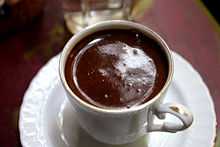Macedonian cuisine
 |
| This article is part of the series |
| Macedonian cuisine Македонска кујна |
|---|
|
Dishes
|
|
Desserts
|
|
Wines
|
|
|

Macedonian cuisine is the traditional cuisine of the Republic of Macedonia—part of Balkan cuisine—reflecting Mediterranean and Middle Eastern influences, and to a lesser extent Italian, German and Eastern European (especially Hungarian) ones. The relatively warm climate in Macedonia provides excellent growth conditions for a variety of vegetables, herbs and fruits. Macedonian cuisine is also noted for the diversity and quality of its dairy products, wines, and local alcoholic beverages, such as rakija.
Tavče-gravče and mastika are considered the national dish and drink of Macedonia, respectively.
Traditional Macedonian foods

- Tavče-Gravče
- Turli Tava
- Ajvar, a bell pepper spread. Can be mild or hot.
- Kebapi
- Polneti Piperki (stuffed capsicum (usually filled with rice or rice with meat)
- Pita (pastry)
- Burek
- Malidzano, an eggplant spread
- Musaka
- Pindzur, a spicy vegetable relish
- Popara
- Pastrmajlija

- Sharplaninski ovchi Kashkaval (hard sheep's milk cheese from the Šar Mountains – Šar Planina in Macedonian)
- Shirden and Kukurek
- Sarma
- Kisela Zelka and Rasolnica (Sour cabbage)
- Mekici (also known as tiganici or pishii), fried lumps of dough
- Chorba od Kopriva (Creamy Nettle Soup)
- Kompir Mandza (a potato and meat stew)
- Pleskavica or burger (also Sharska and Ajducka )
- Kachamak (aka. Bakrdan)
- Zelnik
- Selsko meso is roast beef, pork and lamb with mushrooms, white wine and yellow cheese on top, mostly made in clay pottery
Traditional Macedonian desserts

Drinks
Coffee

Macedonia has a well-developed coffee culture, and Turkish coffee is by far the most popular coffee beverage. With over 5,000 establishments, the traditional Macedonian coffeehouse and bar—the kafeana—is one of the most common places to go out and have a drink. However, because of the negative stereotypes surrounding the kafana, many younger people prefer to frequent the more Western-styled cafés which are also seen as being classier.
From the days of the Ottoman Empire through to the present, coffee has played an important role in Macedonian lifestyle and culture. The serving and consumption of coffee has had a profound effect on betrothal and gender customs, political and social interaction, prayer, and hospitality customs. Although many of the rituals are not prevalent in today's society, coffee has remained an integral part of Macedonian culture.
Other coffee beverages such as lattes, cafe mochas and cappuccinos are becoming increasingly popular with the opening of more upmarket cafés. Professionals and businesspeople have contributed to the popularity instant coffee (especially frappé).
Alcohol

- Wine
- Vranec
- Traminec
- Alexandria
- Smederevka
- Mastika
- Rakija
- Beer
- Skopsko
- Krali Marko
- Zlaten Dab
- Gorsko
- Bitolsko
- Kenbach
- Boza
- Salep
- Yoghurt (Kefir)
- Mineral water
- Gorska Voda
- Pelisterka
- Pella rosa
- Ilina
- Kozufcanka
See also
- European cuisine
- Cuisine of the Mediterranean
- Eastern European cuisine
References
External links
- Macedonian food, cuisine and recipes blog
- Macedonian Cuisine, cuisine and recipes portal
- Macedonian Cuisine, food recipes
| ||||||||||||||||||||||||||||||||||||||||||||||||||
| ||||||||||||||
| |||||||||||
